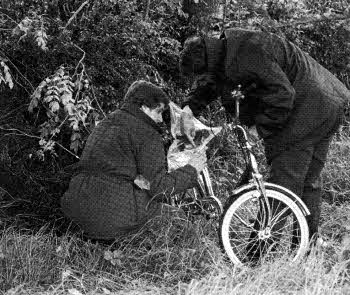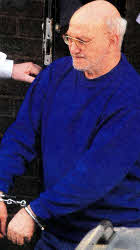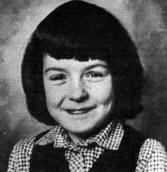- Black Trial day 1
- Black Trial day 2
- Black Trial day 3
- Black Trial day 4
- Black Trial day 5
- Black Trial day 6
- Black Trial day 7
- Black Trial day 8
- Black Trial day 9
- Black Trial day 10
- Black Trial day 11
- Black Trial day 12
- Black Trial day 13
- Black Trial day 14
- Black Trial day 15
- Black Trial day 16
- Black Trial day 17
- Black Trial day 18
- Black Trial day 19
- Black Trial day 20
Court hears case is unique in NI
Black trial day 17

THE murder of a schoolgirl for which serial killer Robert Black stands accused is unique in the modern criminal history of the province, his trial was told on day 17 of the trial.
Notorious Scottish paedophile Black is charged with abducting and murdering nine-year-old Jennifer Cardy while on a day-long work trip across the Irish Sea 30 years ago. He denies the charges.
On a day when it was confirmed that Black will not give evidence in his defence, the jury at Armagh Crown Court heard that while Jennifer's case was the only one of its type in Northern Ireland in 40 years, it shares 12 distinct similarities with the three child murders the former van driver has been convicted of in mainland UK.
The court was also told Jennifer's death remains the only unsolved child murder in the province in the last four decades.
The schoolgirl was snatched as she cycled to a friend's house in the quiet Co Antrim village of Ballinderry in August 1981. She was found floating in a dam behind a roadside lay-by 15 miles away at Hillsborough six days later.
Retired police detective Stephen Clarke told the jury he had reviewed all child killings in Northern Ireland since 1972 and compared them to four criteria common to Black's crimes.
Namely, that the victim was a pre-pubescent girl; that she was snatched from a public place; that she was murdered; and that transport was used.
"There was only one case that fitted the four criteria," he revealed.
And that was the case of the abduction and murder of Jennifer Cardy."
Crown counsel Toby Hedworth QC asked him to confirm this was only such child death in Northern Ireland in the last 40 years.
"Yes, my Lord, the case is unique," said the former detective chief inspector, addressing judge Mr Justice Ronald Weatherup.
Mr Clarke was the last prosecution witness called.
Junior counsel Paddy Taggart opened the defence case by informing the court that Black would not be taking the stand.
Justice Weatherup asked the defence lawyers was their client aware that the jury was entitled to draw an inference from his failure to do so.
Senior counsel David Spens QC confirmed Black was aware of the
situation.
![]()
Black trial day 18
Black not to take the stand in Cardy murder trial
 LAWYERS representing serial killer Robert Black called a solitary
witness as they set out the case
LAWYERS representing serial killer Robert Black called a solitary
witness as they set out the case
for the defence in under two hours during the trial.
Expert forensic pathologist Dr Christopher Milroy gave evidence to Armagh Crown Court on his interpretation of post-mortem tests on nine-year-old Jennifer Cardy, raising doubts on whether she was sexually assaulted.
The court was told that the former delivery driver would not be taking the stand in his own defence.
Jennifer was snatched as she cycled to a friend's house in the quiet Co Antrim village of Ballinderry in August 1981. Her body was found six days later floating in a dam behind a roadside lay-by 15 miles away at Hillsborough.
Dr Milroy, addressing the court via videolink from Malaysia, claimed internal marks found on Jennifer's body were not necessarily proof she was sexually assaulted.
Furthermore, he said the apparent lack of other injuries to her groin area made it less likely that the marks were caused by a sex attack. "It is significant there was no injury," he said.
A sexual motive was identified in the three child murders Black was convicted of in 1994 and the Crown contends Jennifer's murder bears the paedophile's criminal hallmark.
The trial had previously heard two other pathologists disagree on whether Jennifer had been sexually assaulted or not.
Under cross-examination, Crown lawyer Toby Hedworth QC asked the doctor whether it was the case that sexual assaults did not always leave the victims with injuries.
Dr Milroy agreed, adding that it depended on the severity of the abuse.
Black looked on impassively from the dock during the exchanges. Jennifer's parents Andy and Patricia watched from the public gallery.
The trial has also heard debate on whether a stain found on Jennifer's underwear was blood.
Mr Hedworth noted that an experienced forensic scientist had identified the stain as blood upon visual examination in 1981.
Dr Milroy said that did not definitively prove it was blood, and only a scientific test could have done so.
The trial has also heard different theories on Jennifer's likely cause of death - whether she drowned, was strangled or was choked to the point of unconsciousness and then dumped in the water to drown.
Dr Milroy said the appearance of the girl's lungs at autopsy could support either drowning or asphyxia.
Asked by defence counsel David Spens QC which cause was his preference, the expert said: "Probably more likely than not that it was drowning."
But he added: "I don't think you can express a strong preference for one
over the other."
![]()
Black trial day 19
Defence delivers closing statement

THE jury in serial killer Robert Black's latest murder trial must not let their opinion of him cloud their judgment, his defence lawyer urged on Monday, day 19 of his trial.
Natural sympathy for the family of his alleged victim Jennifer Cardy cannot be a factor in their deliberations, either, David Spens QC told Armagh Crown Court.
Delivering his closing statement, Mr Spens said the case must be judged on the facts alone and insisted the Crown had completely failed to prove Black's guilt.
Mr Spens insisted there was no conclusive evidence Black was even in Northern Ireland and claimed the circumstances of the little girl's abduction and death had "striking dissimilarities" with his client's other crimes.
"It must be very difficult for Jennifer Cardy's parents to relive all of this," he said.
The schoolgirl's father, Andy, her mother Patricia and her brother Mark watched from the public gallery as the lawyer opened his address while Black listened from the dock behind his defence advocate.
"You would have the utmost sympathy for her family and at the same time you would have absolutely no sympathy for Mr Black," Mr Spens continued.
But he added: "Sympathy can play no part in your deliberations."
Mr Spens stressed that the nine women and three men of the jury must assess the evidence "coolly, calmly and dispassionately".
On day 19 of the trial, Mr Spens claimed there was no evidence Jennifer had been sexually assaulted, noting that Black was known for molesting young girls he had taken.
The Crown contends Black would have driven past the lay-by where Jennifer was found on the AI dual carriageway while doing delivery drops between Belfast and Newry for his London-based poster dispatch firm.
During the trial, they pointed to old work records and fuel receipts as evidence he was on a Northern Ireland run on the day Jennifer disappeared.
When Black was presented with these documents under police interview in 2005, he said he accepted he would have been there.
But Mr Spens said there was not one piece of evidence that stated definitively that he was in the province.
He claimed his client's "so-called admission" to being there was "absolutely worthless" as he made it while under a false impression of where one of the fuel receipts was issued.
He said the evidence his client was in Northern Ireland on the day was "weak, flimsy and ultimately unsatisfactory".
"The prosecution has simply failed to prove their case against Mr Black, they have failed to prove he was in Northern Ireland on August 12, 1981 and in particular that he was in Newry," he said. Mr Spens said this evidence was supposed to establish whether Black had the opportunity to commit the crime and was therefore absolutely fundamental.
He asked the jury could they be sure beyond reasonable doubt that the defendant was definitely in Northern Ireland on the day. Turning to the circumstances of Jennifer's disappearance and murder, the lawyer said there were a number of factors that simply didn't follow Black's signature of offending.
These included:
• Jennifer was wearing trousers when she was snatched. Mr Spens
said Black had an expressed preference for little girls in skirts;
• The schoolgirl was still wearing both shoes when she was found.
Black's lawyer said this was not the case with his other victims;
• Mr Spens said there was no sign Jennifer was gagged, while there was
evidence Black had done that to a number of his victims.
The trial has heard conflicting expert assessments on the pathology tests on Jennifer's body, in particular on whether she had been sexually assaulted.
Mr Spens suggested the jury could not be certain Jennifer was sexually assaulted.
He said a sexual motive was involved in the crimes Black had been convicted of.
"What the prosecution are trying to do is to fit a square peg —
Mr Black — into a round hole — the circumstances of Jennifer Cardy's
murder," he said. "It doesn't work."
![]()
Black trial day 20
Reach verdict on evidence says Judge
THE judge in Robert Black's latest murder trial said while jurors would likely want to throttle the serial killer if he ever went near one of their children they must reach a verdict on evidence not emotion.
Mr Justice Ronald Weatherup said any jury member would naturally try to inflict serious harm on the Scottish paedophile if he ever confronted one of their loved ones.
But as he directed them at Armagh Crown Court, the judge urged the nine women and three men to take a step back and view the case dispassionately.
Mr Weatherup, before sending the jurors out to consider their verdict, also gave them the option of finding Black guilty of manslaughter.
"All right-thinking people would be appalled about what they have heard about this defendant," Judge Weatherup said as Black looked on from the dock.
Mr Weatherup said the jurors would have been "naturally outraged" when they were told of Black's convictions during the trial.
"You would of course want to throttle him or worse if he came anywhere near any member of your family," he said.
"It's understandable given what you know about him, emotions can run high.
"But I want you to stop, step back and take care and I want you to be careful about what you do.
"I want you to remember you have to judge the matter on the basis of evidence.
I don't want you to consider the matter on the basis that he has been convicted of doing those things to young girls in England and Scotland, that means he's done it here.
You have to be satisfied about his responsibility for this particular offence and not judge him on the basis of what you know about him from other occasions."
Jennifer's parents, Andrew and Patricia, her brothers Philip and Mark and sister Victoria listened to the judge's address from the public gallery.
The judge went through all the evidence presented during the previous 19 days of the trial during his three-hour address.
This included opportunity evidence on whether Black was in Northern Ireland on the day; expert testimony given by three pathologists on the cause of death and whether Jennifer had been sexually assaulted; and the bad character and similar fact evidence based on the killer's past convictions.
He stressed that the onus was on the prosecution to prove Black's guilt, not on the defendant to prove his innocence.
The judge said the jury also had to assess what inference they would draw from the accused's decision not to take the stand.
He said the natural reaction was to feel for Jennifer's family, but he said such sentiments could not form part of their deliberations.
"You can't help but feel sympathy for the family and victim in this case, nevertheless you must look at the matter objectively and consider the evidence," he said.
• THE jury resumed its deliberations in the case on Thursday morning. Judge Mr Justice Ronald Weatherup sent the nine women and three men out on Wednesday to reach a verdict after concluding his directions to the jurors at Armagh Crown Court. The jury failed to reach a verdict after almost three hours of deliberations. Mr Weatherup told them he did not want them to feel under any time pressure to make a decision.

